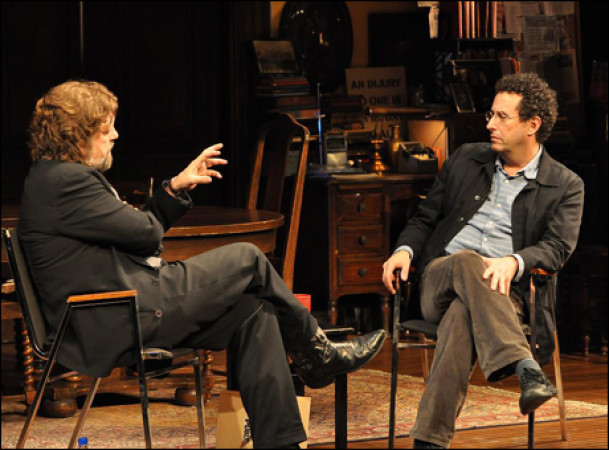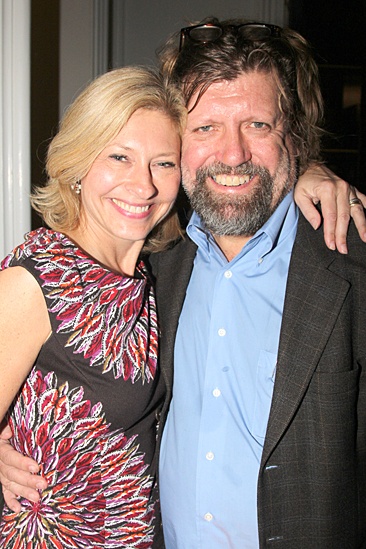Oskar Eustis, Theater Hall of Fame induction speech by Tony Kushner, Nov. 13, 2017
(Click here for an account of the full 2017 Hall of Fame induction of which this was a part; click here for reports on previous Hall of fame inductions back to 1998.)
I always scold Oskar for using superlatives when speaking in public. Oskar is maybe the most enthusiastic person I know, or rather I should say he’s the most enthusiastic serious person I know; what he loves he loves whole-heartedly, voraciously, all-consumingly – not in the sense of wanting to consume that which he loves but rather wanting to be consumed by it, in the sense of wanting to be ravished by what he loves; Oskar is available for ravishment.
He’s not a cheap date, he can’t be had for the price of a cocktail like a salted peanut! But he yearns to be swept off his feet, by a new play, a new musical, a song, a directorial moment, a night in the theater during which mysteries are deepened and/or illuminated and the world in which, in spite of his immensely ethical, scrupulously rational self, Oskar lives in a condition of voluptuous intellect and synthesizing, meaning-generating sensual delight.

He is, in other words, one of the great romantics, he is a miracle of rare device, a sunny pleasure dome with caves of ice, Oskar is in love with the world, the wicked and tragic and enduring and sometimes noble and splendid and beautiful intricately interwoven world. This is what makes time in Oskar’s company so electrifying, so exhilarating, occasionally so alarming: He is fully an inhabitant of the world, and he has made sufficient space inside himself for the world to inhabit, to inhere in him. Oskar is what Ezra Pound called “a serious character.”
And he has, as I said, serious enthusiasms, and as must be true of everyone who works in theater, who loves theater as much as Oskar loves it, he enjoys, from time to time, the dramatic effect of announcing superlatives, for nothing but superlatives can express the fullness of any given moment’s joy. I scold Oskar from time to time about using superlatives. The most lavish praise a public person can afford to employ is comparative praise, I tell him: only ever say that you think “no one is better than person X” & never say that “no one is as good as person X”, because person Y, person Z and persons A-W will hear what you’ve said and be offended. Sometimes Oskar remembers my advice, and sometimes he doesn’t.

Tonight, Oskar, I’m hoist by my own petard – a petard, by the way, is a smidgen of gunpowder, not, as I’d always assumed, some sort of early iteration of the leotard. Tonight you’re being inducted into the Theater Hall Of Fame, and if one isn’t allowed to bring forth and play with one’s superlatives on a night like this, then they never can be trotted out, and what’s the point of even having superlatives if they have to stay in the closet? I’ve already said you’re the most enthusiastic serious person I know, Oskar, and that’s a superlative. Here are some others:
You’re the bravest man I know.
You’re the strongest man I know.
You take pleasure in responsibility, in shouldering communal burdens, more than anyone I know.
You take more pleasure than anyone I know in building things – plays, institutions, relationships.
You take more pleasure and often have more success than anyone I know at attempting to articulate in public why theater matters to the world, and why the world needs theater artists who want to matter to the world.
You’re married to Laurie Eustis, who’s a class of superlative unto herself.
You’re stepfather of Kyle Brown, another super superlative.
You’re my best friend.
I was going to say you’re the smartest man I know, Oskar, and very often you are, but smart is measurable only in context and circumstance, so there are no superlatives when it comes to measuring smart, and also sometimes you don’t agree with me, and I’ve had to take points off for that. But Oskar, you’re certainly one of the five smartest people I know, and your erudition, retention, critical capabilities and curiosity are among the world’s true wonders.
When they write the history of the theater of our time, Oskar, you’ll be at the center of it; because of the electrifying, tough-minded, social-minded productions you’ve directed; because of the great theatrical institutions that you’ve created and nurtured, whose cultural impact you’ve assiduously cultivated and curated; and more than anything else, I think, the playwrights who are indebted to you.
If the works of Suzan-Lori Parks, Lin-Manuel Miranda, David Henry Hwang, Lynn Nottage, Tarell Alvin McCraney, Rinne Groffe, Richard Nelson, Michael J. Friedman Lisa Kron and Jeanine Tesori, to name only a few, survive – and we have reason to hope that if our species manages to survive the many dangers that threaten it, their work likely will survive along with it – since you supplied the fertile common ground for a great deal of what American theater has produced, the history of the theater of our time will look very much like the history of the theater of your time.
So as long as the Gershwin Theater stands, Oskar, your name will be emblazoned here, along with the names of so many illustrious others, at least until someone decides to repaint the lobby. If that happens, Oskar, I don’t worry that you’ll be bitter or despair. You do what you do not for fame, but for justice, love of the world and desire to help build the future, the city on the hill. I feel certain I can speak for the whole theater community, and I’m absolutely speaking for myself: Your life is a great blessing and a generative gift, comrade. More work, more life, long live the Revolution, on to the Midterms!
(For a view of the Eustis-Kushner friendship from the other side, and some background about how it originated and their collaboration on “Angels in America,” click here for a piece by Oskar Eustis — as told to Boris Kachka — in “Vulture,” which originally appeared in New York magazine.)





Sorry, the comment form is closed at this time.